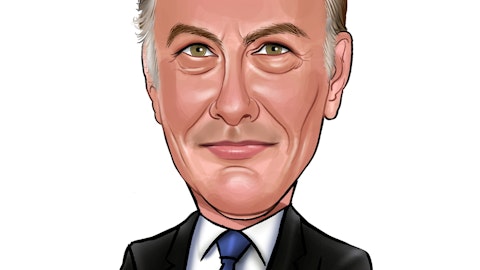Recently, they also put out a press release or they didn’t put out for release, but they had to do a government filing regarding the potentials they may need to downsize. And so our valuation reflects the risks that the Company now faces in light of not being able to raise capital at this time.
Kevin Rendino: So, I would add that. This is exactly why we are not in that business anymore. We were too small. We didn’t have scale. We had no controlling stakes. We couldn’t control outcomes. And as a result, what you’ve seen since basically I came out of retirement to do this with Daniel, is that we’ve had over $20 million worth of losses in that portfolio since we arrived because we can affect outcomes. And what you get in this kind of environment is when companies need to raise money and you’re trying to raise money in this kind of environment, the valuations can get squeezed. So, I hate to beat a dead horse on this topic because I’m not — I don’t believe in constantly harping on the same thing over and over and over again.
But it is true, I’m not sure we would be here today if we didn’t change our stripes because we would’ve run out of cash and be forced to liquidate many of these holdings at prices that would’ve ended up unfortunately resulting in potentially turn stock going away or Harris & Harris stock going away. So it’s been a struggle to get to this point. We’ve never been able to make appropriate investment decisions or strategic decisions really until now, because now 97% of our assets are in the strategy and in public companies that we can control. We have permanent capital. So in a year like this year, while there’s liquidations and people selling and tax loss selling, we don’t have to sell. And so, I’m not happy that we got to the end of our transformation with AgBiome getting written down this quarter, but it is what it is.
I signed up for this when I got here in 2017, and it’s over now. I don’t have to worry about it anymore. Because like I said, 97% of the assets are in our public company, so we have other things to worry about, but the private portfolio is not one of those anymore.
Daniel Wolfe: You’re welcome, anything else?
Kevin Rendino: Hi, Zach, go ahead.
Zach Liggett: Can you hear me?
Kevin Rendino: Yes.
Zach Liggett: I appreciate the conviction and the strategy and the cheapness of the asset class. I guess my question is, what if anything is the Board doing are you guys doing to help with the scale problem? Because I see — now we have 5% risk free. You got a 5% expense ratio, you don’t include these bonuses. And that, I mean, that’s a big hurdle even if this asset class and your performance turns up. So I’m curious, is the board looking at trying to find partners to merge into, the possibility of a rights issue or anything else where you guys can actually act on the conviction for shareholder benefit because this hurdle seems very high for you guys to clear.
Kevin Rendino: So, I think you know that when we’ve — if you don’t, when we first got here, we meaningfully cut our expenses overnight. We moved out of Manhattan. We let a lot of people go. I don’t have an administrative assistant. Our teeny budget got cut by 95%. We’ve done everything that we can do on an absolute level to reduce our expenses. And the ratio now is to your point it’s depended upon our ultimate level of assets. So a year ago, the ratio that you referenced was half of what it is because we had more assets. So, as you would think, we — and we just had a Board meeting last week, the Board is actively engaged in discussing with management ways to increase our assets whether that’s our ability to fundraise on the outside, which we’ve done.
As we had a one gigantic pension fund that we managed, that unfortunately has been redeeming, because rates have gone from basically 0% to 5%. So their asset allocation strategy has changed to what I think the peak, Daniel, we had maybe $35 million or $40 million, $40 million in outside capital, and they decided that they no longer wanted to own equities. There’s nothing we could do about that. So, we’re always looking for ways to raise capital, and we’ll continue to do that. And from a strategic perspective, we’re a public company. If somebody wants to own us, they can certainly give us a call. I think you know we’re shareholder friendly. We can certainly entertain merging with anybody to gain greater assets. But remember, a lot of those transactions have to be done at NAV because of 40 Act Funds require that other than because they have to get a shareholder vote.
So those mergers between closed-end funds historically or BDCs have been few and far between. Daniel, would you?
Daniel Wolfe: Yes. I mean, they’re not very — they don’t happen extraordinarily often because of all the hurdles that Kevin mentioned, the fact that most — almost all of them trade at some level of discount, they can vary. Transactions would have to take place at NAV. And then you also have the issues that a lot of the externally managed to close end funds. We’ve actually reached out to some of the externally managed closed-end funds ’cause they only four internally managed. And we reached out to some of the smaller ones to see if there was an interest in maybe doing something. And there’s very little inertia for those funds and those managers to give up that management fee. And so, it’s those conversations really haven’t gone anywhere, but we continue to explore a variety of different options.
So, we’re shareholder friendly around here. I mean, I don’t own 700,000 shares for — to not create value. I will say that despite the fact that in the last — our first five years, despite the fact that we had almost $3 a share in losses from our private portfolio, we more than doubled our equity price. So, it’s not like we can’t do that again. We can, and now we don’t have the headwind that we had seven years ago because our portfolio is all public companies at what we think are ridiculous prices. So, our ability to meaningfully generate a return for our shareholders in the next three years is higher today than it was seven years ago. But you can expect our board to be actively engaged in all discussions around how to create value whether that’s inorganic growth or organic growth.
Operator: Hi, David. Please go ahead.
Unidentified Analyst: Can you help us understand the discount management program? How well actually works? Is it at each quarter, and then you judge how far the discount is and then what are you likely to actually do?





